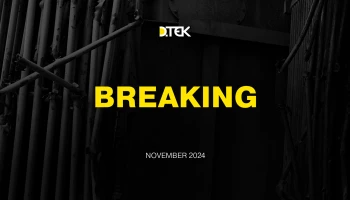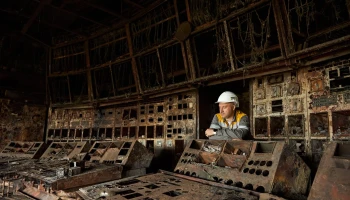In an interview with Radio NV, Dmytro Sakharuk, DTEK's Executive Director, talked about the scale of damage to the energy infrastructure after the massive attacks by the terrorist state and explained how Ukrainians should prepare for the winter.
—We know exactly how we, Ukrainians, differ from Russians: We value people the most. What do we know about the casualties at those facilities that were shelled?
—We currently know that eight of our employees were injured: four at one plant, four at the other. Unfortunately, one of the four died in an ambulance as a result of the injuries.
—What exactly were these facilities shelled with? Missiles, Iranian Shahed-136 drones?
—In one case it was missiles, and in the other case—artillery fire.
—As DTEK’s Executive Director, do you have an understanding of how to protect such strategic critical infrastructure facilities of Ukraine?
—I think everyone understands perfectly well that civilian infrastructure facilities, when they were built, were not designed to withstand attacks of missiles, bombs and shells. This civil infrastructure was built to serve people, to provide them with light and heating.
We are now dealing with terrorists. There is no other term I can use to describe their actions, it's just terrorism.
How do we protect civilian infrastructure?
Of course, we have done everything we could to protect our equipment from shrapnel and other small explosive devices, but this is not enough. The only effective and possible protection is a reliable air or missile defense, which will prevent drones or missiles from hitting our substations, thermal power plants or other critical infrastructure.
—Is air defense the only thing that can help?
—Not only air defense can help against Iranian drones. These are low-flying aircraft that can be heard and shot down with simple large-caliber firearms. Israel's or South Korea's experience shows that they create appropriate air defense centers or points in the form of large-caliber machine guns that shoot down these drones. There are many of them, they are quite densely located.
I think that, having such a neighbor as Russia, we will have to place protection systems similar to those in South Korea on multi-story buildings or in other places near each critical facility. Even in Kyiv, where the drones flew in on Monday, it would probably have been possible to shoot down those five unhit drones if we had a denser defense in the form of large-caliber machine guns that can shoot down these drones.
—Since October 10th, there has been massive shelling of all our infrastructure throughout Ukraine. How serious is it?
—Extremely serious. The enemy knows where to strike. They are probably advised by Russian power engineers: it is obvious that targets are professionally designated and methodically shelled. And this is done after a certain time has passed and someone has seen what damage has been caused. Then they resort to repeated shelling of the same facilities.
For example, one of our plants was hit twice, another plant was hit for the second time today. They [Russians] checked whether [the plant] was disrupted or not. If not or partially disrupted—they finish it off.
When he spoke last week, [Russian dictator Vladimir] Putin said, "we have 29 targets that we want to hit with as many weapons as possible". And they are hitting them. They really hit professionally, systematically; they know where to hit. And I understand that they are not going to stop until they completely destroy the facilities that are already almost destroyed.
—Are there any instruments of pressure on Russian energy sector workers and companies that are now helping to commit war crimes?
—I think that the only effective instrument of pressure on them is sanctions against those companies that operate abroad. These are mostly the companies that build or maintain nuclear or hydroelectric power plants, build or supply large equipment, turbines, transformers or some other large expensive equipment.
At least those plants that were built during or after the Soviet Union using Soviet or post-Soviet technology should be subject to sanctions.
Regarding pressure on the specific people who provide consultations, I think they are consulted from the Russian grid operator, where many people worked during the Soviet Union, people who remember and know these infrastructure designs. Moreover, they are not secret. And they just work with the military. Sanctions will not affect them specifically because they work only in Russia.
—It may take years to restore the damaged or destroyed part of the infrastructure. Do you think our Western partners can help us in any way?
—Of course they can because equipment is the most important element of restoration. Not construction works but equipment that is [intended] for such facilities as a substation or a thermal power plant, a combined heat and power plant. They are ordered in advance and manufactured in one or two years, and there is a waiting list for such equipment.
It is not like in a supermarket where you just come and buy. These are piece products made only when orders come. Therefore, the main thing that can help is the supply of equipment that has been destroyed.
This is a large range of equipment: transformers, switches, automation equipment, cable products, etc. There are many things that are needed to restore critical infrastructure. And this is probably the easiest thing they can do, because I am sure that they have equipment in warehouses or factories, or energy companies, or in state reserves that can now be quickly moved to Ukraine and installed. Even temporarily, and we can return it after we buy or order the equipment and it arrives. I think this is the most important thing our foreign partners can help us with now.
—Because of these attacks on our critical infrastructure, Ukraine has stopped exporting electricity to Europe. It was an important source of our income. Do you think it is possible to import electricity from Europe?
—It is technically possible because our system is now synchronized with Europe. We have now been allowed the commercial volume of electricity that we can export. Similarly, Europe may allow us to import electricity because there is a technical flow that does not correspond to the commercial one. For commercial imports, you need to get the appropriate permission, but I think that for them to give us the permission is not a problem at all.
Therefore, it is possible to import both technically and politically. But the price of this electricity may be an issue. It is no secret that electricity in Ukraine is three and even more times cheaper than in Europe. And we will have to pay for this electricity. You have to pay in foreign currency, and pay on time, because you simply won’t get it if you don’t.
The second question is whether Europeans themselves have energy now? We are entering the winter, and they have a deficit. We exported electricity for a reason. Why did we do it? Because we had a surplus, and they had a deficit. It is important to start talking about imports now, but the possibility of actual imports will depend on two things: firstly, whether we are able to pay for it, and secondly, whether electricity is available for imports to Ukraine.
—There was news that DTEK had shipped 100 thousand tons of coal to support state TPPs. How can coal help us? How does it work?
—Of course, the basis of our electricity is nuclear energy, hydropower and thermal generation. These are the three big blocks on which the foundation rests. And the new direction is renewable energy sources, which only started to develop five years ago.
Now, almost half of the renewable energy sources remain in the occupied territory. First of all, these are wind power plants. Six units of Zaporizhzhia nuclear power plant (the largest in Europe) remain in the occupied territory. Almost ten gigawatts, if we count nuclear and thermal units, are there and are temporarily not used by Ukraine.
Therefore, thermal generation along with nuclear and hydro generation are now key. Thermal generation works on coal; coal is mined in Ukraine in Donetsk region, in the center of Ukraine and in the west. Of course, it will not be enough in the situation we are in now. It will be necessary to extract everything that is possible to ensure the system’s stability.
Unfortunately, it is difficult to mine coal now because we have lost many factories that produced equipment for coal mining. We need to import equipment, which means paying in foreign currency and in advance. Third, the price has grown quite significantly due to inflation. Fourth, it’s logistics. It is also problematic because there are interruptions in transportation.
There are many difficulties. We need coal now to get through the winter. We as a company are doing our best to produce coal at the last year’s level. It is quite difficult. It is necessary to support the energy sector, which essentially pays for this coal, to provide money for coal so that it can continue to be mined and transported to the plants, and so that we have electricity.
—Ukrainian officials warn that we should be prepared for power, water and heating cuts. You said that the winter will be hard, and we understand why. How should we prepare for the winter?
—It is quite difficult to prepare for the winter when it comes to people living in cities. Because in cities people live in multi-story buildings and are completely dependent on centralized water, heating and electricity supply.
When it comes to people living in private houses, it is a little easier. They can arrange for alternative sources of heating and energy. How? Generators are installed for energy, and heating can be secured with some boilers that work on solid fuel, pellets or other type of fuel.
I recommend everyone living in houses to make sure they have not one but several sources of energy, both heating and electricity. It also helps if it’s possible to install solar panels. Thanks to solar panels, many people could live in their homes even in March, when Kyiv region was occupied, even when there was no electricity. So this will help.
Unfortunately, it will not be warm enough in the apartment, so we will have to find some solution. Perhaps not to live in all rooms, if possible, to move to houses where there are alternative fuel sources.
If all this is not available, what should be done? Take care of the insulation of windows and doors so that the minimum amount of heat escapes. And during peak hours, as already mentioned, we should save energy as much as possible so as not to create an additional load on the power system.
All these measures will allow us to pass the winter with the least problems.
—We have seen how the enemy has been acting since February 24. We could expect that closer to winter he would start attacking our energy infrastructure. Did you personally expect him to cross this line?
—Yes, I did. I think I was not the only one. Many people were preparing for this. We also have been getting ready as a company—we strengthened our power substations, plants, open switchgears in order to protect the equipment as much as possible. We have been working to accumulate the maximum amount of coal at our plants. I know that our Ministry has been preparing, and so has Ukrenergo—everyone bought additional equipment, created stocks of spare parts, etc.
But when it comes to such a significant amount of destruction, in fact, terrorism and the use of such a powerful weapon against peaceful critical infrastructure facilities... Of course, there is no shortage of spare parts, transformers, because the volume of destruction is huge.
So, yes, we knew, and we have been getting ready, we have done everything we could. I think if we had not been prepared, our consumers would have experienced outages of electricity, water supply, heating and other usual amenities for much longer. These are things that we have been taking for granted in our homes. And now it turns out that soon this won’t be the case in our apartments.
Moreover, when we had power cuts, some consumers said they would pay five, six or even ten times more for electricity, just so it’s not turned off. They asked not to turn off the electricity in cottage towns or some districts.
They were ready to pay more for priority electricity supply. I have not seen this before. This means that people are ready to pay for this amenity, which was previously just taken for granted.
Based on the material of NV Business






